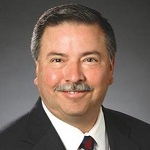The idea popped up last year as payers went to battle against pricey hepatitis C drugs: Next in line for the treatment could be the forthcoming class of cholesterol-fighters known as PCSK9 inhibitors. Now that Express Scripts ($ESRX)--and rival CVS Health ($CVS)--have cost-slashing exclusives with hep C drugmakers, the activist PBM says it's ready to take on those meds, too.
And after that? Three guesses, and they all start with oncology.
 |
| Express Scripts CEO George Paz |
Playing hardball on PCSK9 meds "is the short-term, and cancer is the long-term," said Express Scripts CEO George Paz at the JP Morgan Healthcare Conference.
PCSK9 products are all injectable antibodies, so they're necessarily more expensive than cholesterol pills like AstraZeneca's ($AZN) Crestor, one of the few top statin drugs still on patent in the U.S.--and even more so compared with off-patent pills such as Pfizer's ($PFE) Lipitor and Merck's ($MRK) Zocor. They aren't likely to be approved for first-line use, but patients with hard-to-control cholesterol are going to be moving from these cheap, commoditized meds to biologics that could cost $10,000 a year--for a lifetime. Multiply that by the many millions of people who might be eligible? That makes the hep C bolus look easy.
The words "highly prescribed" and "expensive" may be anathema to PBMs, but they're music to drugmakers' ears. After all, Sanofi ($SNY) and Regeneron ($REGN) aren't spending some half-a-billion dollars on a long-term outcomes trial to end up with a drug that won't bring in the big bucks. Analysts figure their alirocumab will deliver, too--some $3 billion a year, eventually. Amgen's ($AMGN) evolocumab is also pegged at $3 billion in annual sales.
Thing is, the hep C negotiations--successful negotiations, we should say--lay out a template for the PCSK9 class. As with the new generation of hepatitis C drugs, the PCSK9 meds are likely to hit the market fairly close together. Sanofi and Regeneron's alirocumab is neck and neck with Amgen's evolocumab, while Pfizer is scrambling to get its competitor going soon after. That virtually instant competition puts PBMs in a position to pit companies against one another for exclusive, cut-rate deals.
The big-name companies in the market aren't talking about price yet. But the CEO of Esperion Therapeutics, which is working on its own cholesterol-fighter, tells Bloomberg that the landscape has definitely changed. "We're seeing payer activism for the first time," Esperion's Tim Mayleben told the news service. "It's changing all the dynamics."
So, should makers of pricey oncology meds start quaking in their boots? Definitely. "The big opportunity out there is really in cancer," Paz said at the conference. "If we can get out in front of that, that is a huge opportunity."
- read the Bloomberg story
Special Reports: Top 10 best-selling cancer drugs of 2013